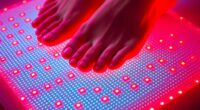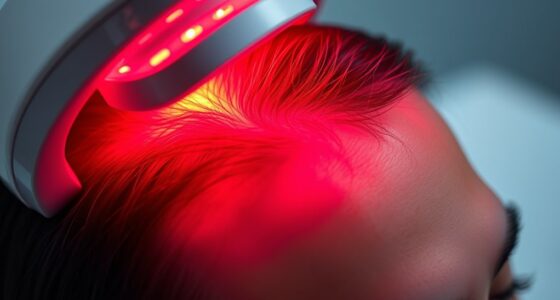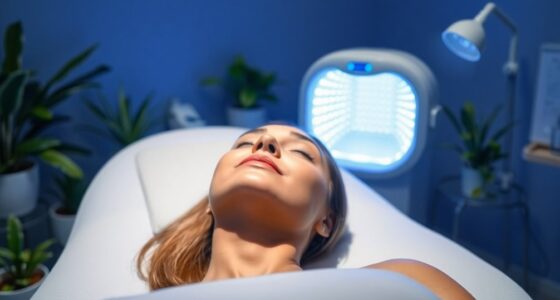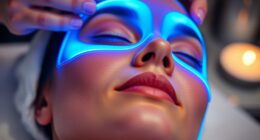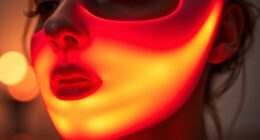Blue light from screens can boost your skin’s sebum production, making your face oilier and more prone to clogged pores. You might notice increased shine, blackheads, or breakouts on areas like your forehead, nose, and chin. Over time, this excess oil can worsen acne and enlarge pores, contributing to uneven skin texture. If you want to discover how to manage these changes and protect your skin effectively, keep exploring the best skincare strategies.
Key Takeaways
- Blue light stimulates increased sebum production, leading to oilier skin, especially in areas like the forehead, nose, and chin.
- Excess sebum can clog pores, resulting in blackheads, whiteheads, and acne breakouts over time.
- Prolonged blue light exposure may cause enlarged pores and rough skin texture due to oiliness.
- Increased sebum from blue light can accelerate skin aging signs, such as fine lines and wrinkles.
- Implementing skincare strategies like oil-free products and blue light filters can help mitigate these effects.
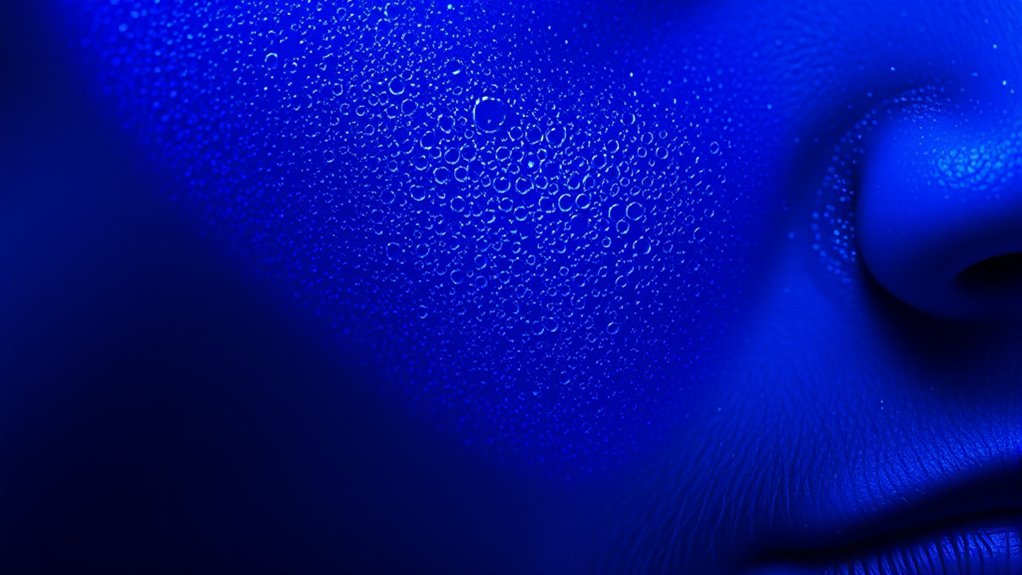
Blue light, emitted by screens and digital devices, can impact your skin’s health by stimulating increased sebum production. When you spend hours scrolling through your phone, working on your laptop, or binge-watching shows, you’re exposing your skin to this high-energy light. Unlike UV rays, blue light penetrates deeper into the skin’s layers, reaching the sebaceous glands that produce oil. This exposure can trigger these glands to go into overdrive, leading to a surge in sebum secretion. As a result, your skin might appear oilier and more prone to breakouts, especially if you’re already dealing with acne-prone skin.
Blue light from screens can increase oil production and worsen acne-prone skin.
You might start noticing shiny patches on your forehead, nose, or chin after prolonged screen time. Increased sebum doesn’t just make your skin look greasy; it also creates an environment that encourages acne-causing bacteria to thrive. The excess oil can clog pores, resulting in blackheads, whiteheads, and inflamed pimples. Over time, this can contribute to persistent skin congestion and even scarring if left unmanaged. If you’re already prone to acne, blue light exposure might worsen your condition, making it harder to keep your skin clear.
You could also experience a change in your skin’s overall texture and tone. The excess oil can lead to enlarged pores, giving your skin a rougher appearance. furthermore, blue light exposure can promote oxidative stress, which damages skin cells and accelerates aging signs like fine lines and wrinkles. This oxidative stress can weaken your skin’s barrier, making it less resilient against environmental pollutants and irritants, which further exacerbates oiliness and inflammation.
To combat these changes, you should consider incorporating skincare products that regulate sebum production, such as non-comedogenic moisturizers and oil-free sunscreens. Regularly cleansing your face with gentle, sulfate-free cleansers can also help remove excess oil and prevent pore blockages. Using antioxidant-rich serums or creams can neutralize free radicals generated by blue light exposure, reducing oxidative stress. Additionally, taking breaks from screens, practicing good skincare habits, and applying blue light filters on your devices can minimize the intensity of exposure.
In essence, if you spend a lot of time in front of screens, expect your skin to produce more oil over time, which can lead to a host of skin concerns. Being proactive about skincare and limiting exposure can help you manage these changes effectively. Recognizing how blue light influences sebum production empowers you to make better choices for maintaining clearer, healthier skin despite the digital age.
Frequently Asked Questions
Can Blue Light Affect Skin Aging Over Time?
Yes, blue light can affect your skin aging over time. It generates free radicals that damage collagen and elastin, leading to wrinkles and fine lines. Prolonged exposure accelerates skin aging, especially if you don’t protect your skin with antioxidants or sunscreen. To minimize these effects, consider using skincare products with antioxidants and wearing protective clothing or filters when exposed to screens or blue light sources.
Does Blue Light Exposure Worsen Existing Skin Conditions?
Think of blue light exposure as a storm cloud gathering over your skin; it can intensify existing conditions like acne or rosacea, making them flare up or linger longer. You might notice increased redness, irritation, or breakouts, especially if your skin’s already sensitive. To protect yourself, consider using calming skincare products and limit your screen time. Being proactive helps your skin weather the storm more easily.
How Long Should I Avoid Blue Light Daily for Skin Health?
You should limit blue light exposure to about two hours daily to protect your skin. Take breaks every 20 minutes when using screens, and consider using blue light filters or glasses. If you notice skin issues, reduce exposure further and incorporate skincare routines that support skin barrier health. Remember, consistency matters, so make these habits part of your daily routine for the best results.
Are Some Skin Types More Sensitive to Blue Light?
Some skin types are more sensitive to blue light, much like a delicate flower reacting strongly to harsh sun. If you have sensitive or acne-prone skin, you might notice increased irritation or breakouts after blue light exposure. Studies show that people with fair or already inflamed skin tend to experience more pronounced effects. Pay attention to your skin’s response and consider protective measures if you notice irritation or heightened sebum.
Can Blue Light Exposure Be Mitigated With Skincare Products?
Yes, you can mitigate blue light exposure with skincare products. Look for antioxidants like vitamin C and E, which help neutralize free radicals caused by blue light. Using broad-spectrum sunscreens with zinc oxide or titanium dioxide also provides a physical barrier. Incorporate calming ingredients such as niacinamide or aloe vera to reduce potential irritation. Consistently applying these products creates a protective layer, minimizing blue light’s impact on your skin.
Conclusion
Remember, what you feed your skin matters. Blue light can influence sebum production, but with mindful skincare, you can keep your skin balanced. Think of it like tending a garden—you have to nurture it daily to see growth. Stay consistent, use protective measures, and don’t forget that small habits make a big difference over time. As the saying goes, “A little effort now pays off later,” so take care of your skin today for a healthier tomorrow.

